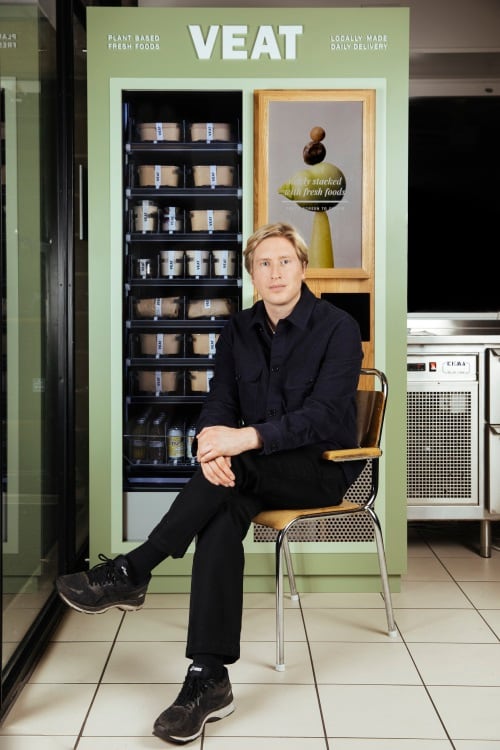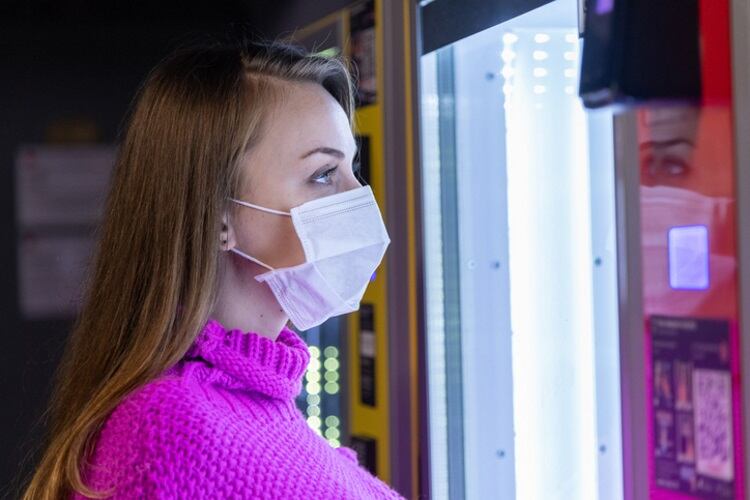The Swedish startup deployed its first vending machines in Stockholm earlier this month in a push to motivate a more sustainable food system by providing accessible and affordable plant-based food.
The locations include large department stores, co-working spaces and headquarters of major banks and corporations around Sweden’s capital city.
The plan is to set up at least another 10 vending machines in Stockholm before the end of the year, and to expand to other European capitals in 2021.
Apart from answering the increasing demand for more plant-based options, amid COVID restrictions, VEAT’s vending machines work as a safe food distribution point outside the conventional restaurant environment amid COVID restrictions.
To further its mission, VEAT has secured €500,000 in pre-seed funding from investors such as Pale Blue Dot (which exclusively invests in climate startups), Avito alum Erik Segerborn, Edastra’s Robert Ahldin and Shio Equity, among others.
Innovative business model

VEAT – founded by Andreas Karlsson – stems from the growing trend of vending machine startups in the US that offer sustainable grab-and-go options, such as Chicago-based Farmer’s Fridge and New York-based Fresh Bowl.
Karlsson – who was studying for his graduate degree at Yale University at the time – decided to introduce the concept to Europe, but taking it a step further by exclusively featuring a menu based on 100% plant-based foods.
“We need to change the way we eat, for human and planetary health. Eating in a nutritious, sustainable way in a busy urban life is often both difficult and expensive,” said Karlsson.
“The neat thing about vending machines as a distribution channel is that we’re more flexible; we can scale up faster and keep prices lower than conventional restaurants and cafés.
“We also see this as a powerful distribution and marketing channel for all the exciting innovation currently happening in the plant-based space.”
The menu – designed by leading Swedish chefs using locally sourced ingredients – includes a selection of snacks, wraps, salads, ready-to-heat meals and beverages, ranging in price from SEK 29 to SEK 85 (€2.80 to €8.30), making them very affordable.
The meals are freshly prepared in VEAT’s kitchen, before being delivered daily to the machines. Any unsold food is donated to local charities.
Investors joining the pre-seed round include:
- Pale Blue Dot: VEAT is the first Swedish investment for this €50m venture capital fund.
- Robert Ahldin: founder of Stockholm venture capital company Edastra; and a previous investor in Motatos, a Swedish impact e-commerce scale-up founded on the insight that huge amounts of food are wasted along the value chain; and Matsmart, which sells surplus food online.
- Erik Segerborg: angel investor (former deputy CEO of web application development company Avito).
- Purple Orange Ventures (Gary Lin): Berlin-based impact seed fund.
- Shio Equity: invests in health, nutrition and related tech companies.
- Daniel Skaven Ruben: VEAT’s advisor and an investor in a number of foodtech startups.
Lowering the barriers
“The food system accounts for one quarter of all greenhouse gas emissions, 70% of all freshwater use, and 50% of the world’s habitable land use. We need urgent, concrete actions to make the food system environmentally sustainable, and VEAT is a new, positive example,” said Ruben.
“VEAT has the potential to fundamentally change the grab & go segment in European capitals, and drive the shift towards a more sustainable food system. With its innovative business model, VEAT is lowering the barriers for people to adopt more nutritious and sustainable dietary patterns,” added Hampus Jakobsson, general partner at Pale Blue Dot.
“We’re excited to join at an early stage and support VEAT in their journey to make Europe a little greener.”


